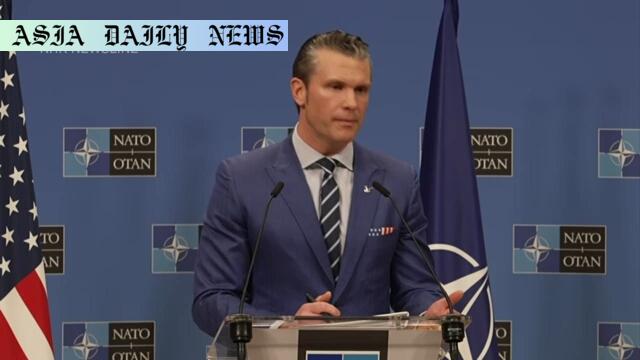China threat: US Defense Secretary Pete Hegseth emphasizes that the US alone can’t deter China and highlights the need for alliances.

The Rising Chinese Threat
US Defense Secretary Pete Hegseth has openly acknowledged the limitations of America’s unilateral efforts to counter China’s influence. Speaking after a NATO defense ministers’ meeting in Brussels, Hegseth categorically stated that China’s ambitions pose a significant threat to freedom and security. Described as “a threat to free people everywhere,” the communist Chinese regime is viewed as a rising power seeking to challenge global norms and reshape the Indo-Pacific region to its advantage.
The Importance of Allied Cooperation
Hegseth emphasized a clear shift in US strategy: a pivot toward building and reinforcing coalitions in the Indo-Pacific region. Key allies such as Japan, South Korea, the Philippines, and Australia play a pivotal role in this evolving strategy. These nations share the US’s concerns over China’s increasing geopolitical confidence and assertiveness. According to Hegseth, working hand-in-hand with these nations is essential for maintaining a balance of power in the region.
The Europe-Asia Link: Prioritizing Threats
In an earlier NATO meeting also held in Brussels, Hegseth drew a connection between Europe’s role in supporting Ukraine and the Indo-Pacific strategy. He highlighted the need for European nations to focus their efforts on bolstering Ukraine’s defense against Russian aggression. By taking a more dominant role in Europe, US resources could be better concentrated on addressing the strategic challenges posed by China in Asia.
China Policy: Balancing Conflict and Cooperation
Despite the warnings and strategic shifts, Hegseth made it clear that the United States does not seek conflict with China. The intent is not to provoke hostility but to create a network of nations capable of deterring any coercive actions from Beijing. Hegseth highlighted that US President Donald Trump maintains a positive working relationship with Chinese President Xi Jinping, leaving room for dialogue and diplomacy amidst rising tensions.
The Stakes in the Indo-Pacific
China’s rise has been marked by its ambitious Belt and Road Initiative, rapid military modernization, and ongoing tensions in the South China Sea. These factors have raised alarms across the globe, particularly in Washington and allied capitals. If unchecked, China’s influence could lead to impediments in trade, security, and even the sovereignty of nations in the Indo-Pacific and beyond.
Japan, South Korea, and Australia: Critical Allies
Japan continues to be one of the most steadfast US allies in the region, playing a critical role in deterring China’s ambitions. South Korea, another key partner, aligns closely with US interests, particularly in terms of regional security. Australia’s increasing alignment with the US also represents a strong front against any coercive regional moves by Beijing. These nations collectively act as anchors in the Indo-Pacific coalition against China.
The Future of US-China Relations
While the US strategy seeks to focus on building alliances to create mutual regional strength, the core emphasis remains on preventing conflict. Strategic deterrence combined with careful diplomacy will continue to guide US-China relations. However, given the challenges associated with an increasingly assertive China, the ultimate success of this strategy will depend upon the collective resolve of allies to protect the principles of freedom and sovereignty.
Commentary
Global Cooperation is Key
Hegseth’s recent comments underscore the United States’ realization of its limitations in countering China’s ambitions independently. The move to strengthen alliances in the Indo-Pacific is both pragmatic and necessary. However, robust partnerships require substantial investments in trust, capabilities, and a shared vision, particularly in a region as diverse as the Indo-Pacific.
The Moral Imperative to Act
The US’s responsibility to deter China extends beyond its own national interests. It’s about ensuring that smaller nations in the region do not succumb to coercion or aggression. Nations like the Philippines and smaller Southeast Asian nations look to powers like the US and its allies for leadership in maintaining peace and security.
Future Challenges and Opportunities
Despite its importance, this shift towards cooperation faces critical hurdles. Diverse political priorities and economic reliance on China among US allies may present challenges. Yet, therein lies an opportunity to establish a united front while fostering shared economic growth and security benefits.
Conclusion
The road ahead is complex, but the United States, alongside Japan, South Korea, Australia, and others, has a real chance to preserve peace in an era of strategic competition. Cooperation, diplomacy, and resilience will be the watchwords in this evolving geopolitical landscape.


